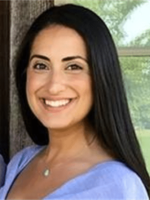For the past year, Drs. Vivian Ly, Danielle Aslan and Jamie Zeman (pictured, top to bottom) have shared insights and experiences from their chiropractic residencies in the Veterans Administration (VA) healthcare system. This summer, all three are moving on to the next chapter of their careers, but not without some important revelations about patient care, the roll of evidence, and more garnered during their unique educational experiences. Below, the doctors share a few parting thoughts:
What lessons you will take away from your experience in the VA?

- What you say and how you say it matters; all of this is patient dependent.
- Ask questions, not just for the sake of checking off “onset” or “provocative factors,” but to learn more about a patient’s pain and use the answers to guide diagnosis.
- As providers, we’re all working on the same team with the same goal of helping patients.
 Dr. Aslan:
Dr. Aslan:
- Chronic pain management in the VA is shifting and evolving, with positive effects on patient care, as seen through the Whole Health Initiative.
- Everyone has their own story, and it is always worth a listen.
- Making your patients feel heard is one of the most important things you can do for them.

- Everything works some of the time, nothing works all of the time; being able to acknowledge when and to whom to make referrals to is an important skill.
- First messages matter; taking time during the initial encounter to address patient expectations of treatment, active vs. passive care, and self-efficacy helps to set clear objectives for the care plan.
- Communication is key in patient-centered care and empowering patients to become active participants in their care.
Did you have a favorite moment during your residency?
Dr. Ly:
There is a World War II veteran that I see periodically. I generally do not bring up a veteran’s time in the service, but one day, while he was getting treated, we got on the topic of his time as a Marine. He told me several stories from the battle of Hiroshima—some funny and light-hearted stories, some about war and combat. It was brief but truly amazing to hear his stories first hand, and a moment that I will always remember.
Dr. Aslan:
I have a patient who primarily used a motorized scooter to get around, and due to the layout of the chiropractic treatment rooms, he could not drive the scooter into the room. We would have him park his scooter outside the door, and I would assist him walking into the room. This patient is in his late 80s, and has such a wonderful sense of humor; he would insist that rather than me holding onto his arm to support him, he would hold onto both my shoulders, and we had to “conga dance” all the way into the treatment room! It will definitely be something I never forget.
How have you changed as a practitioner during the past year?
Dr. Aslan:
I think I have found myself as a practitioner, and my style of patient interviewing/interaction, and I have become more comfortable as an autonomous provider. I still have a lot to learn, and much more growing to do, but I think having the opportunity to learn under my attendings while learning and becoming autonomous has been invaluable.
Dr. Zeman:
As a new graduate, it can be cumbersome to organize the vast amount of procedures, techniques, and skills taught in the classroom into a practice style that best suits the new practitioner. With the advanced clinical training and scholarly activities centered around evidence-based practice, I have made great advancements in my clinical competencies and confidence as a provider. Having the mentorship of senior VA chiropractors has been instrumental in helping me outline my goals for future career and educational endeavors.
Has this experience changed your future career plans at all?
Dr. Ly:
In school, I didn’t fully understand the value of evidence. During residency, I’ve learned how research can guide policy and create change in health care and it motivates me to contribute. I have had the opportunity to develop and implement a small research project and present it at ACC-RAC. It was an incredible experience and it has encouraged me to learn more about the process of research and, though I want to continue was a clinician, I am also excited to do some research and scholarly activities.
What is your advice to the next cohort of VA chiropractic residents?
Dr. Ly:
Ask questions, be curious. There is bound to be information that a person doesn’t know, and we are not required to be all knowing. Evaluate your working knowledge and if you could learn more about whatever it may be, then ask questions, look things up and keep learning.
Dr. Aslan:
Every patient is different, and every patient has a story to tell. If you can, take the time to learn the story of your patient, because it may be similar to yours. I like to think about how nervous a patient may feel in a new environment, with a new provider, and act as humanistic as possible. I think it helps when a patient realizes you’re not just their healthcare provider, but a human with a story, too. Find points of common interest and try to remember little details of what they say to you – I think that will go a long way.
Dr. Zeman:
Treat every moment as an opportunity for learning, even if you may not agree with the lesson. There will be interactions that may not directly correlate to clinical practice, but can still encourage growth as a healthcare professional. I found myself writing down pros and cons of communication styles in inter-professional meetings, small details of scheduling and other clinic layouts, lists of other specialty organizations, etc., which were great prompts for self-reflection later. Enjoy it and seize every opportunity—a year goes by quick!
To read past blog posts from the VA residents, click here. To learn more about the VA chiropractic residency program, visit the VA website.
